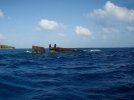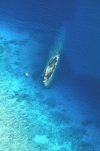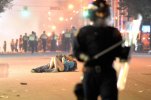I hope everyone (in the US) had a meaningful Memorial Day.
As a person who lived through Vietnam, I think I understand something about the horrors of war. And not all war is necessary. But sometimes it is. That, in itself, may be the most horrible fact about war. But the young men and women who are sent to it and die will always deserve our respect and should never be dismissed from our memory.
I am staunchly anti-war. But I am as staunchly pro-soldier/sailor/etc. With this in mind, here is a poem for this day, written by a British poet and soldier, Wilfred Owen. He died in action in World War I.
Dulce et Decorum Est
BY
WILFRED OWEN
Bent double, like old beggars under sacks,
Knock-kneed, coughing like hags, we cursed through sludge,
Till on the haunting flares we turned our backs,
And towards our distant rest began to trudge.
Men marched asleep. Many had lost their boots,
But limped on, blood-shod. All went lame; all blind;
Drunk with fatigue; deaf even to the hoots
Of gas-shells dropping softly behind.
Gas! GAS! Quick, boys!—An ecstasy of fumbling
Fitting the clumsy helmets just in time,
But someone still was yelling out and stumbling
And flound’ring like a man in fire or lime.—
Dim through the misty panes and thick green light,
As under a green sea, I saw him drowning.
In all my dreams before my helpless sight,
He plunges at me, guttering, choking, drowning.
If in some smothering dreams, you too could pace
Behind the wagon that we flung him in,
And watch the white eyes writhing in his face,
His hanging face, like a devil’s sick of sin;
If you could hear, at every jolt, the blood
Come gargling from the froth-corrupted lungs,
Obscene as cancer, bitter as the cud
Of vile, incurable sores on innocent tongues,—
My friend, you would not tell with such high zest
To children ardent for some desperate glory,
The old Lie:
Dulce et decorum est
Pro patria mori.
Note:
Latin phrase is from the Roman poet Horace: “It is sweet and fitting to die for one’s country.”








